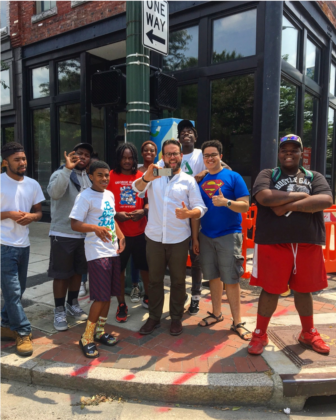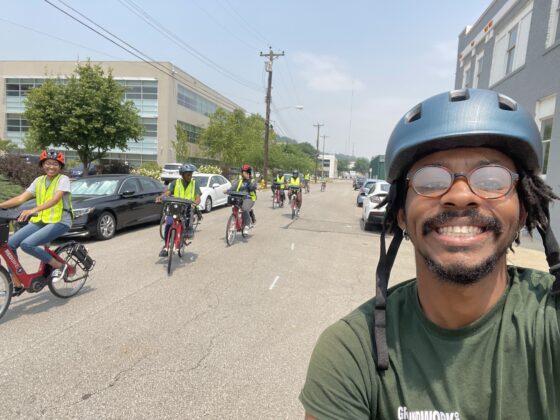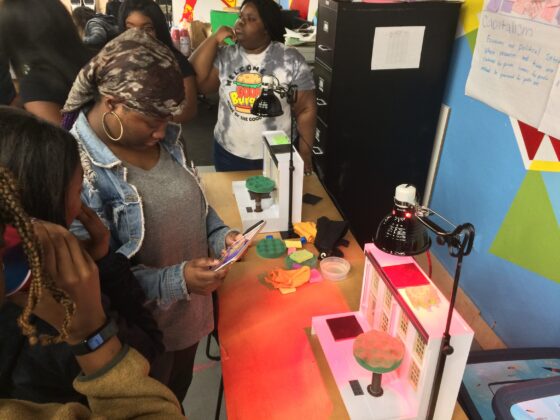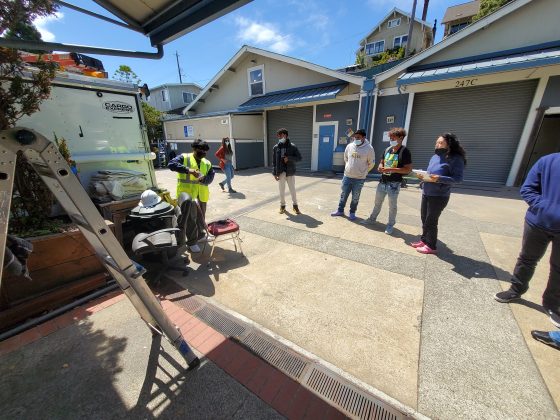
While climate change affects everyone, its impacts are deeply personal and vary significantly. You might experience extended heat waves, extreme storms, frequent power outages, or rising costs of utilities and food. Perhaps you’ve sweltered at a bus stop in dangerously hot weather, wrestled with worsening asthma due to poor air quality, or cleaned out a flooded basement twice this year. No two neighborhoods are impacted the same way. So, although understanding major climate trends is important, it is equally important to understand the impacts at the individual level.
Community science is a powerful way to capture these smaller-scale climate patterns and empower people to make informed choices to mitigate harm. While there is increasing familiarity with citizen science, where residents submit their hyper-local data to be analyzed by scientists, community science takes things one step further by involving community members in every step of the process — from identifying research questions to collecting and analyzing data. This approach ensures that the research addresses the specific needs and concerns of the community, leading to more relevant and actionable insights. Through community science, residents collect data to understand their community’s specific climate challenges and use this data to inform actions and organize for change.
Groundwork Trusts are increasingly incorporating community science practices into their work to enhance community engagement, broaden educational opportunities for youth, inform climate adaptation plans, and prioritize investments. Across the network, Groundwork Trusts have found innovative ways to integrate the community into their climate resilience efforts, creating change one city block at a time.
***
Guiding Planning Processes and Advocating For Change

As part of Groundwork Ohio River Valley’s Climate Safe Neighborhoods work, the community action group in the Lower Price Hill neighborhood (Cincinnati, OH) voiced concerns about poor air quality affecting their health. In response, Groundwork ORV organized the “Connecting Air Quality to Citizen Climate Advocacy & Action” project, a comprehensive plan to measure air quality differences across several communities. Groundwork ORV trained youth leaders and residents to use personal and outdoor air quality monitors and educated trainees about the health consequences of air pollution. They outfitted bikes with air quality sensors so their Green Team – a paid environmental leadership and stewardship program for high school students – could measure variations in particulate matter in their neighborhoods. Green Team participants even built their own air quality sensors in a hands-on workshop. The data they collected over 12 months contributed to the development of the 2023 Green Cincinnati plan. And, Groundwork ORV is currently using data from the air quality monitors to advocate for funding for green infrastructure projects designed to reduce air pollution.
targeting investments

In the early phases of its Climate Safe Neighborhoods effort, Groundwork RVA collaborated with Vivek Shandas and the Science Museum of Virginia to conduct a heat mapping campaign across Richmond, VA, providing temperature sensors to volunteers and youth leaders to measure the heat index in their neighborhoods. They strapped these sensors to the backs of cars and bikes to record temperature changes in different parts of the city at three different points during the day – early morning, afternoon, and night. The data they collected highlighted the areas of Richmond that are more vulnerable to extreme heat. Neighborhoods with more impervious surfaces and less tree canopy coverage experienced temperatures up to 16°F hotter and a greater difference between morning and afternoon temperatures than other areas with more green space and shade. These data have been instrumental in helping the city government determine where and how they should invest grant funding for heat mitigation efforts. Groundwork RVA has also used the data to advocate for a more equitable distribution of climate resilience measures in Richmond.
increasing community wellness and safety

Located at the intersection of major highways, ports, and other industrial infrastructure, Richmond, CA has some of the worst air quality levels in the state. Through its Air Rangers program, Groundwork Richmond employs and trains young people to manage a network of air quality monitors across the city. Youth install the sensors in homes, parks, and public spaces, connect them to the city-wide monitor network, provide routine maintenance, and lead community outreach efforts to teach residents about the dangers of air pollution. The Air Rangers also planned a Clean Air Day event with the city and, using the data they collected, proposed interventions to reduce air pollution. The neighborhood-level, real-time air quality data help residents make informed choices for themselves and their families about where and how they spend their time outdoors.
***
Community science empowers individuals to design experiments and shape the data collection efforts impacting their neighborhoods, fostering civic engagement and understanding and giving residents the evidence to advocate effectively for common goals. At Groundwork USA, we are learning from Trusts’ experiences with community science and capturing their learnings to elevate our organizing efforts on a larger scale. We aim to use the community science models the Trusts have been using to amplify patterns across our network and facilitate opportunities for residents to come together to discuss the implications and goals of their community science projects. As Jeremy Hoffman, Director of Climate Justice and Impact explains, “It’s very much a reinforcing cycle of data collection, meaning-making, and interpretation.”
